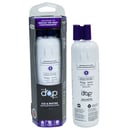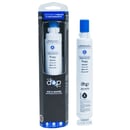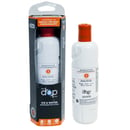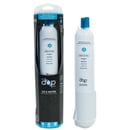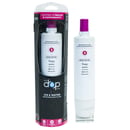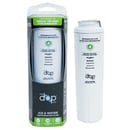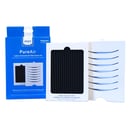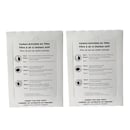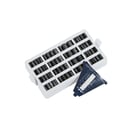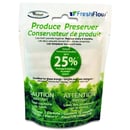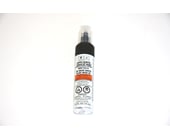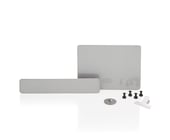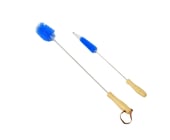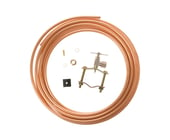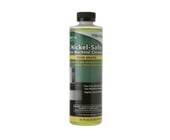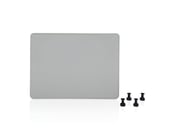- Kenmore refrigerator water filters
- Whirlpool refrigerator water filters
- Samsung refrigerator water filters
- GE refrigerator water filters
- LG refrigerator water filters
- Frigidaire refrigerator water filters
- KitchenAid refrigerator water filters
- Maytag refrigerator water filters
- Kenmore Elite refrigerator water filters
- Estate refrigerator water filters
- GE Profile refrigerator water filters
- Amana refrigerator water filters
- Bosch refrigerator water filters
- Dacor refrigerator water filters
- Electrolux refrigerator water filters

Official KitchenAid refrigerator water filters
Not sure which is the right EveryDrop® water filter for your KitchenAid refrigerator? Use our Refrigerator Water Filter Finder for help or browse all KitchenAid water filters below.
Refrigerator water filter finder
What brand is your refrigerator?
All KitchenAid refrigerator water filters
Back Order
$59.99
In Stock
$49.99
Back Order
$59.99
Back Order
$59.99
In Stock
$59.99
In Stock
$59.99
KitchenAid refrigerator air filters
In Stock
$29.46 |
17% OFF Phone Price : $35.46
In Stock
$28.91 |
17% OFF Phone Price : $34.91
In Stock
$16.74 |
11% OFF Phone Price : $18.74
In Stock
$20.89 |
22% OFF Phone Price : $26.89
Frequently asked questions about KitchenAid refrigerator water filters
Do all KitchenAid refrigerators use the same water filter?
KitchenAid offers a variety of refrigerator styles, and the water filters used vary by model. You can find your specific water filter using our water filter finder or entering your model number in the search bar. Your owner’s manual may also list the correct water filter part number for your model.
Why does my KitchenAid refrigerator use a Whirlpool water filter?
KitchenAid is a part of the Whirlpool family of brands; the filters used by the Whirlpool family are the EveryDrop water filters.
How do I replace the water filter in my KitchenAid refrigerator?
Replacing the water filter in a refrigerator can vary depending on the specific refrigerator model, the location of the filter in the refrigerator, and the style of the water filter. Our How to replace the water filter in a KitchenAid refrigerator provides step-by-step instructions and video tutorials to assist you throughout the process. You can also find specific replacement details for your particular filter style in the list below or in your owner's manual.
- How to replace a remove-cup-filter-cover refrigerator water filter
- How to replace a push-button-to-eject refrigerator water filter
- How to replace eject-and-slide-out refrigerator water filters
- How to replace twist-to-remove refrigerator water filters
- How to replace swing-out refrigerator water filters
- How to install an inline refrigerator water filter video
Why should I change my refrigerator water filter?
Your refrigerator water filter becomes less efficient over time, as it traps more and more impurities. As the water filter fills with impurities, you might notice that water flow is slowing. Changing your water filter ensures that you get filtered water that tastes and smells good.
How often should I change my refrigerator water filter?
Refrigerator manufacturers recommend installing a new water filter every 6 months. If you notice water flow slowing, change it sooner.
Can I use my refrigerator without the water filter?
Almost all refrigerator water systems will work without the water filter. With the water filter removed, unfiltered water flows directly to the ice maker and water dispenser. Check your owner’s manual for instructions on using your refrigerator without the water filter.
We don’t recommend using your refrigerator without the water filter unless your home uses a whole-house water filter.
What is NSF certification?
NSF International tests and certifies thousands of products—including refrigerator water filters—to verify they meet public health and safety standards. Water filters that meet NSF standards bear the NSF certification mark.
KitchenAid refrigerator water filters are certified by the NSF to remove chlorine taste and odor (NSF standard 42). Many KitchenAid water filters also can remove lead and cysts (NSF standard 53), and some have passed additional NSF certification tests and are certified to remove volatile organic compounds, pharmaceuticals and some pesticides (NSF standard 401). Learn more about NSF certification here.
To ensure your water filter can trap all the impurities and contaminants it’s been proven to remove, replace your refrigerator water filter every 6 months. We can send you your KitchenAid water filter replacement automatically (and with free shipping), so you don’t have to remember to reorder.
RECOMMENDED KitchenAid MAINTENANCE PARTS AND ACCESSORIES
- $40.57 |28% OFF Was : $56.67
- $35.44 |14% OFF Was : $41.44
- $14.09
- $32.53 |16% OFF Was : $38.53
- $27.22 |18% OFF Was : $33.22
Most common symptoms to help you fix your kitchenaid refrigerators
Choose a symptom to see related refrigerator repairs.
Main causes: damaged door seal, faulty defrost sensor or bi-metal thermostat, broken defrost heater, bad defrost timer o…
Main causes: control board or cold control failure, broken compressor start relay, compressor motor failure, defrost tim…
Main causes: blocked vents, defrost system problems, evaporator fan failure, dirty condenser coils, bad sensors, condens…
Main causes: leaky door gasket, defrost system failure, evaporator fan not running, dirty condenser coils, condenser fan…
Main causes: jammed ice cubes, broken ice maker assembly, dirty water filter, kinked water line, bad water valve, freeze…
Main causes: blocked air vents, compressor problems, condenser or evaporator fan not working, control system failure, se…
Main causes: water valve leaking, frozen or broken defrost drain tube, overflowing drain pan, cracked water system tubin…
Things to do: clean condenser coils, replace the water filter, clean the interior, adjust doors to prevent air leaks, cl…
Most common repair guides to help fix your kitchenaid refrigerators
These step-by-step repair guides will help you safely fix what’s broken on your refrigerator.
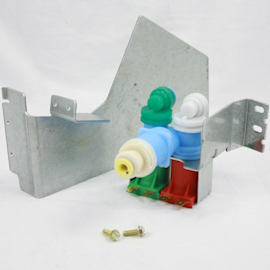
How to replace a refrigerator water valve
Replace the water valve that feeds water to the ice maker and water dispenser if it no longer controls the flow of water…
Repair difficulty
Time required
15 minutes or less
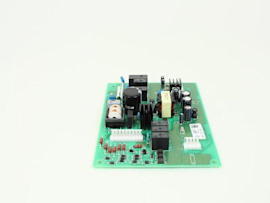
How to replace a refrigerator temperature control board
If the temperature in your refrigerator doesn't match the temperature you set, the problem could be the temperature cont…
Repair difficulty
Time required
30 minutes or less

How to clean refrigerator condenser coils
Help your refrigerator run more efficiently by cleaning the condenser coils. It's easy and takes just a few minutes.…
Repair difficulty
Time required
15 minutes or less
Effective articles & videos to help repair your kitchenaid refrigerators
Use the advice and tips in these articles and videos to get the most out of your refrigerator.
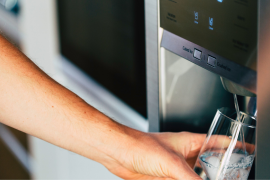
No matter what style Maytag refrigerator you have, we can walk you through replacing the water filter.…

Learn about all the convenient features on our Sears PartsDirect website that make your parts purchases easier.…
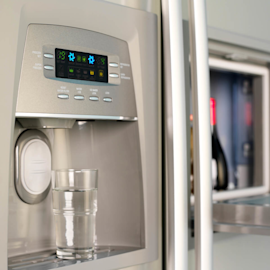
If your refrigerator's ice maker isn't producing as much ice as it should, or water is flowing poorly from the dispenser…
